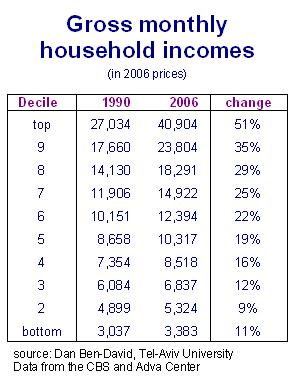|
PDF file
published
in Haaretz on December 18, 2007 under the title “The Facts Are Bad Enough”.
Science Fiction
by Dan Ben-David What can one do when a well-known
organization, one that supports many of the same issues as I, systematically
cuts corners over the years as a means of promoting its objectives? When the actual facts are deemed insufficient
and the organization decides to present only a partial picture of reality – one
that is based on data chosen with tweezers – then there arises a danger that
the public may lose faith in the entire social agenda being pursued. Paul Krugman once wrote about
interested parties who pour “a steady stream of money into think tanks that
create a sort of parallel intellectual universe, a world of ‘scholars’ whose
careers are based on toeing an ideological line, rather than on doing research
that stands up to scrutiny by their peers ... There are several reasons why
fake research is so effective. One is that nonscientists sometimes find it hard
to tell the difference between research and advocacy – if it’s got numbers and
charts in it, doesn’t that make it science?” “Even when reporters do know the
difference, the conventions of he-said-she-said journalism get in the way of
conveying that knowledge to readers. I once joked that if President Bush said
that the Earth was flat, the headlines of news articles would read, ‘Opinions
Differ on Shape of the Earth.’” The Adva Center just published it
annual report on Israeli society. Underneath
the headline “Growth is not good for everyone” appears a graph showing how
incomes in three different income deciles have behaved over the past decade and
a half. While incomes in the top decile
rose steadily, incomes in the two other reported deciles – the second and sixth
deciles – appear to be treading water since 1990. The explanation accompanying the graph
focuses only on the steep increase in the incomes of the wealthy. The combination of misleading headline, graph
and incomplete explanation yield a seemingly self-evident picture of what
transpired in the lower income deciles. On a separate page is a table that the
press likes to report. It shows the
decline in the share of total income by each of the eight lower deciles. The only income shares exhibiting an increase
between 1990 and 2006 were those of the top two deciles. It is no coincidence that the merging of this
table together with headlines of the type quoted above can lead the reader to
conclude that “Growth in Israel is only for the wealthy” as stated in the title
of a Ynet article including the table that was published on the heels of last
year’s report. However, the truth does not exactly
match the impression that many receive from the Adva report. Had they simply shown the incomes of each
decile in 1990 alongside the incomes in 2006, like in the accompanying table, then
it would have been possible to clearly see the income increases in every single
decile. But then, it would not have been
possible to infer that growth was bad for society’s poor – which is the
mistaken perception that they were trying to convey. The real problem is not a widespread
decline in the living standards of the poor but rather the steadily increasing
inequality. This is a serious phenomenon
that has been developing for three straight decades. It entrenches Israel ever deeper into the
unflattering club of countries characterized by the greatest income inequality
in the West. As a result of public policies
influenced considerably by narrow-minded, personal and sectoral interests, one
part of the country is leaving behind a growing remainder. The abysmal education that Israel supplies
and the inadequate infrastructures that it provides deprive an ever increasing
segment of its population the primary tools needed for surviving – not to
mention prospering – in a competitive economy and modern society. This is the latent danger underlying
misleading reports and statements, even if original personal intentions might
have been good. The public could
eventually conclude that everything it hears is no more than science fiction, a
conclusion that may lead it to disengage from rather than to deal with the root
causes of the problems – and we will continue progressing toward the social
explosion that inevitably awaits. comments
to:
danib@post.tau.ac.il
|
